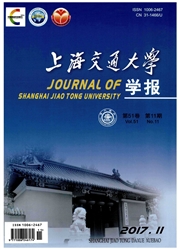

 中文摘要:
中文摘要:
针对差分滤波(DDF)算法存在因噪声统计特性与实际不符而导致的滤波精度降低甚至发散的问题,提出了一种基于支持向量回归机的自适应差分滤波(SVRADDF)算法.将测量值的新息协方差与理论协方差之间的差值作为支持向量回归机的输入、输出调节噪声统计特征的自适应因子,实时修正DDF噪声协方差,根据实际噪声变化调整噪声协方差矩阵,从而提高滤波精度.针对水下目标纯方位角跟踪系统的蒙特卡洛仿真实验表明,在相同初始噪声特性条件下,所提出的SVRADDF算法具有较好的估计效果和鲁棒性,估计精度、稳定性及收敛时间等性能明显优于单纯DDF算法.
 英文摘要:
英文摘要:
To solve the low filtering accuracy problem of the divided difference filter (DDF) algorithm, this paper proposed an support vector regression based adaptive divided difference filter (SVRADDF) algorithm. The difference between the measurement innovation covariance and theory covariance matrix were used as the adaptive factor of the input and output of the support vector regression machine for real-time correction of the DDF noise covariance and the adjustment of the noise covariance matrix according to the actual noise changes, so as to improve the filter precision. Monte Carlo simulation for underwater target bearing-only tracking systems indicates that, with the same initial noise conditions, the proposed SVRAD- DF algorithm has a better estimation performance and robustness. The accuracy, stability and covergenee time are significantly better than the DDF algorithms.
 同期刊论文项目
同期刊论文项目
 同项目期刊论文
同项目期刊论文
 期刊信息
期刊信息
